T-Mobile: "Do it right or don't do it at all"
Those eleven new riders are a combination of young and old, and a real international mix, coming...
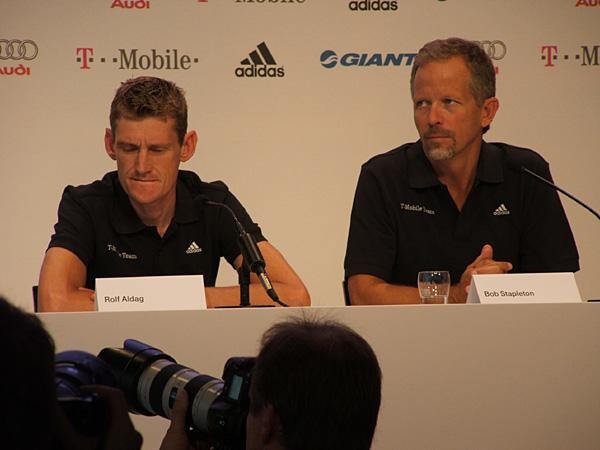
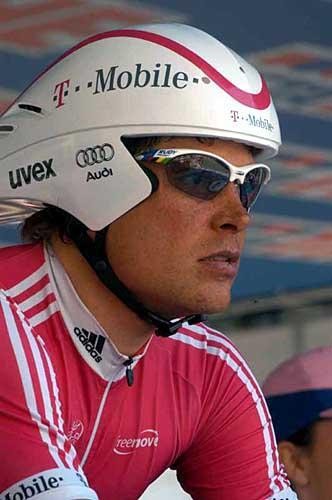
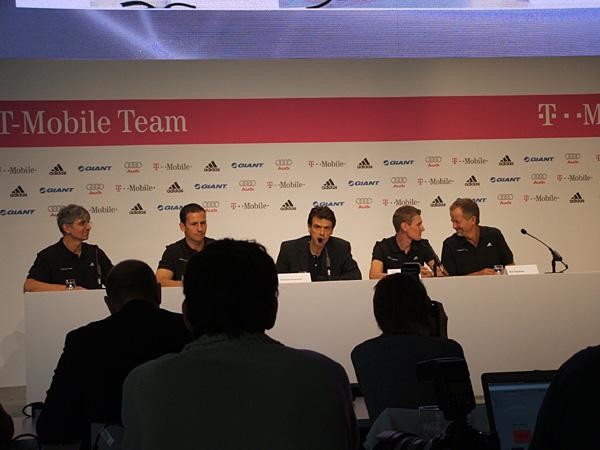
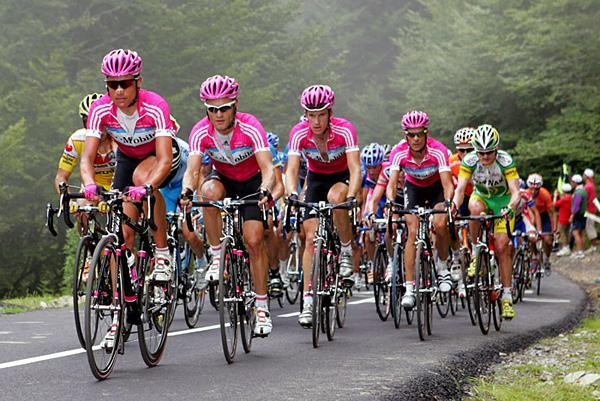
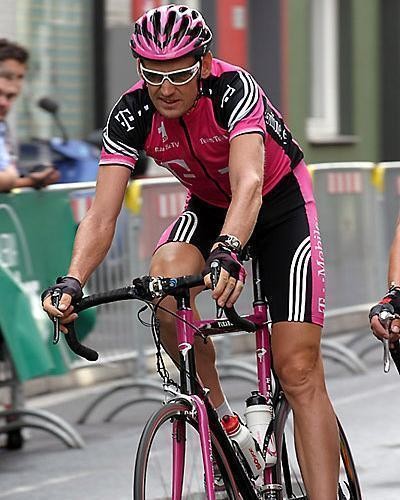
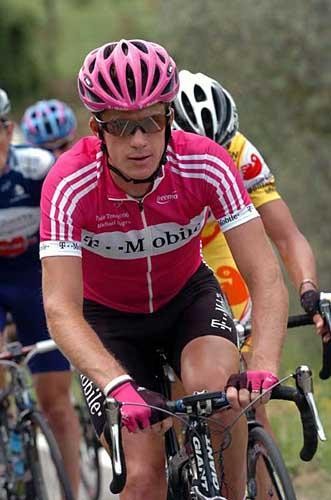

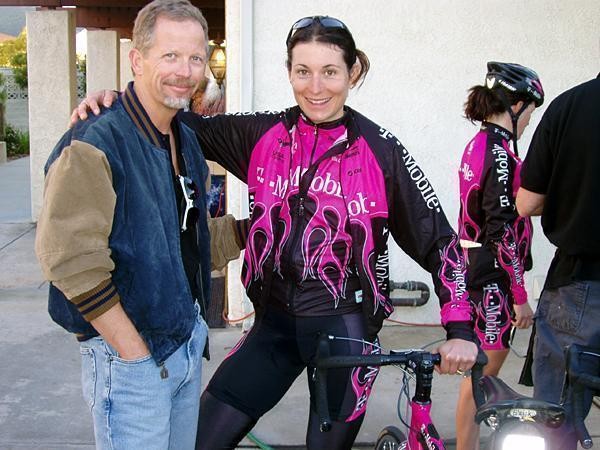



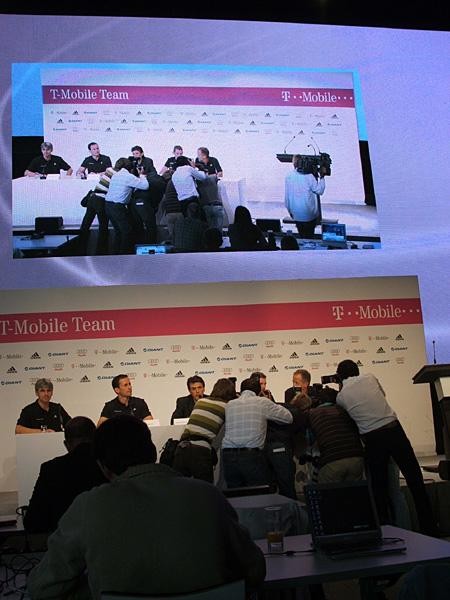

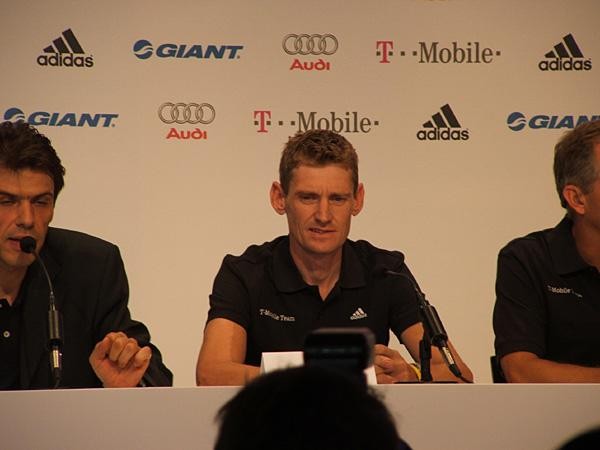
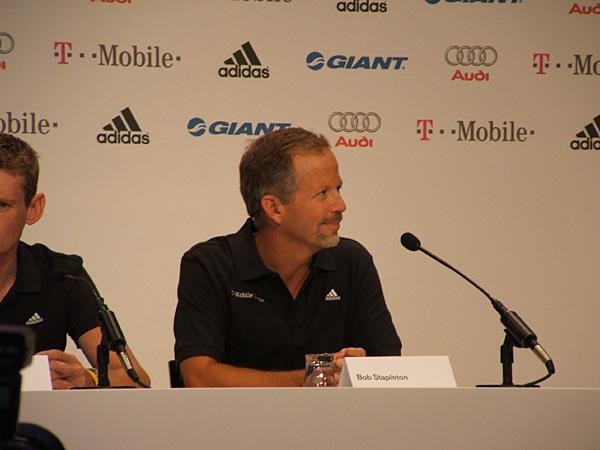

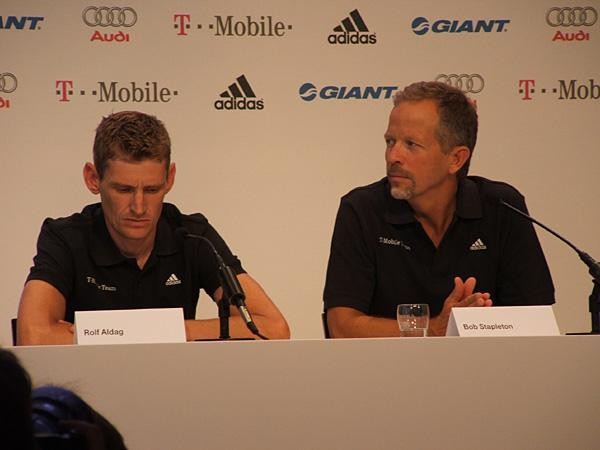
News feature, September 28, 2006.
The T-Mobile Team is looking to a clean and fair sport, and wants to take a leading role in providing it. And to do so, they have come up with their own new beginning, changing virtually everything within the team, from management on down. A new general manager, a new sport manager, 11 new riders - they are all combining to become what new general manager Bob Stapleton hopes will be "the best cycling team in the world and eventually the best sports franchise in the world," he announced Wednesday, September 27 at a press conference in Bonn, Germany. Cyclingnews' Susan Westemeyer reports.
Those eleven new riders are a combination of young and old, and a real international mix, coming from nine different countries. They join 16 riders remaining from the 2006 squad, from six different countries. There are still three places left up for grabs.
The "new" team almost didn't come to be. T-Mobile Chief Finance Thomas Winkler admitted that the company seriously considered dropping its sponsorship of the team after the revelations before the Tour de France of Jan Ullrich's implication in the Fuentes doping case. "But after 15 years of involvement with the sport, you don't just throw your sponsorship away. We, as the management of T-Mobile Corporation, believe in cycling and we believe in the image of clean cycling." To prove this, it has extended its contract for an additional two years, through 2010. Winkler said that the firm has full trust in Bob Stapleton, whom the company has known for six years. And Aldag, the new Director of Sport Management, "stands for everything that you should stand for in cycling."
Stapleton, incoming general manager of the team, said, "We believe we have been the leader in this sport for the last 15 years. We intend to stay true to our German roots and make the team more attractive to young German riders. The team has lost its momentum in that direction the last few years." In addition, "it is also important to us to be competitive and draw on riders from the whole peloton," not just Germany. The international aspect is also reflected in the selection of directeurs sportifs, with four countries being represented.
He has an "uncompromised" commitment to clean and fair sport. "We are leading from the front of the pack and intend to stay there." The team is introducing screening, testing, training, development, a firm code of conduct "that goes beyond the Pro Tour code of ethics." The team's code covers all of an athlete's conduct, "not just doping but any behaviour that might be detrimental to the team."
Three sponsor partners are returning, Stapleton noted: Giant Bicycles, Adidas and Audi - "the sorts of brands that bring credibility to the team." But the contracts with all of the sponsors and co-sponsors have changed. "They can all cancel their contracts in the case of doping incidents," Stapleton noted. "I support that."
Get The Leadout Newsletter
The latest race content, interviews, features, reviews and expert buying guides, direct to your inbox!
He concluded by describing what he is looking for in a team: "winners on and off the bike, success through teamwork, motivation and fighting spirit, led by example by the sporting management."
The team has also introduced a new medical and training program. The rider's medical supervision will all be done at the University of Freiburg and there will be strict internal controls, including increased training controls and many tests done by the team medical staff. Each rider is to have a health profile established, containing their physical data, results from lab testing, and samples from controls - and it will include a DNA sample.
"The antidoping program is a key element," said team doctor Lothar Heinrich. "But it is not the only element. We want to support the riders' athletic development so that they can compete cleanly and effectively." Prevention is important, too. "The athlete must be supported so that they can optimise their performance. We have to support young riders. Our experienced riders must support them in partnership - they have an important role to play."
Until now, all training had been left to the individual rider. He could seek his own trainer - no questions asked - and could, but wasn't required, to use the team medical facilities. That will now change. All training will be coordinated by a central source, who will check out all the trainers. They will send all the data to this central source, which will analyse it and work with the trainers to develop training programs.
The team will also introduce sports psychology - a field that had never before been much involved with cycling. The riders will be introduced to active psychological techniques that they can use in training and in races, to improve the performance. "We hope it works," said Dr. Heinrich. "We have the best that sports psychology can offer, and we will give our riders all the advantages that other athletes enjoy."
Dr. Andreas Schmid is in charge of the team's medical team at the University of Freiburg. The team will give a yet undetermined sum of money to the WADA and NADA to finance at least three unannounced training controls per rider per season, both blood and urine testing. There will also be strict internal controls and sampling, with urine and blood samples to be stored for possible future testing. The team will make regular blood volume tests, at least six per rider per year, under the eye of an independent expert team.
Rolf Aldag rode for Telekom/T-Mobile from 1993 to 2005 - virtually his whole career - and after retiring from riding, spent a year away from the team. This year gave him a distance to the squad, which helped him develop an insight as to "what do we need, what can be changed, how can we build a new team."
His new group of directeurs sportifs, Tristan Hoffman, Alan Peiper, Brian Holm, and Valerio Piva is "a group that I really trust. We all discussed who fits in this new team." One major change is there will be no more individual superstars on the team. "The team must stand in the foreground," Aldag said. And not just the team of riders, but the whole overall team. "The respect for mechanics and masseurs is very important to me." In addition, the riders will be divided up among the DS's, so that each rider will have one with whom he keeps closely in touch.
Aldag's major task was to assemble the team of riders - not an easy one under the circumstances. "Fifty percent of our discussion time was about doping controls. Everyone who signed a contract knows that legal steps will be taken if he proves to have deceived us. If a rider hurts our image, why shouldn't he pay for that damage? They must be willing to accept responsibility for their actions."
He also commented on some of those who have left the team this year, voluntarily or otherwise. "The mistake with Ullrich was his team within the team," with his closed circle of friends and advisors. This did not display "the team spirit that is needed." And as to Andreas Klöden, the two held extensive discussions. "I told him what we expected of him, leadership expectations. 'We expect you to take part in this process of leading the Tour team, and you are the man for results.'" Klöden ultimately decided to sign for Astana. "My personal view is that he slept on it and didn't want to accept this responsibility."
Different riders left for different reasons, Aldag added. Klöden thought he would be better off at Astana. Others indicated at the very first discussion that they wanted to leave the team. And some were not offered contracts because they didn't have "the feeling of loyalty that the team expected."
And even contract negotiations were different than before. Each started with a 30-minute discussion of what is required of the rider. Tests were made before contracts were signed. And all the riders are expected to appear at the University of Freiburg and be checked out from top to bottom. The first blood volume tests will be made in October.
And who of this new troupe is expected to be the captain? "We have Michael Rogers who was 10th in the Tour as a helper. Naturally it will be hard for him to podium in Paris, but we will give him all the support he needs. Maybe we put too much pressure on riders in the past." Aldag concluded, "We don't assume that 2007 will be our most successful season. But what is success. Does only a win count? What about a good performance, when a rider delivers the best performance he is capable of and fulfills our expectations. That is a success, too."